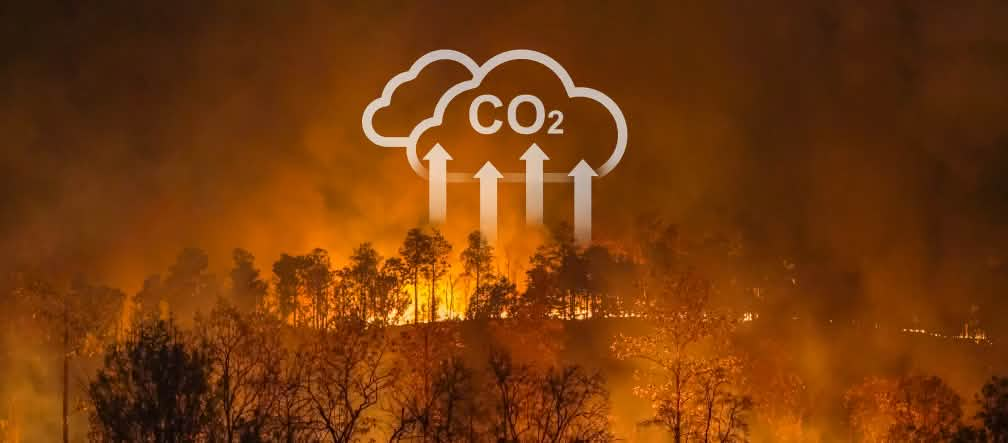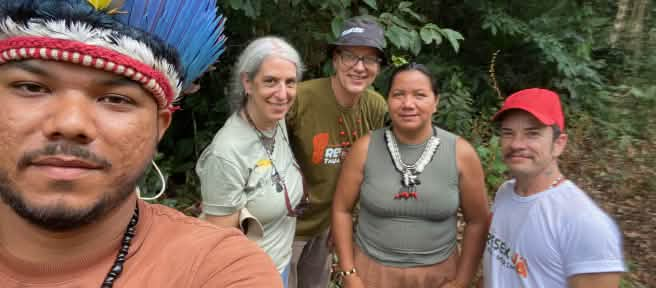
A call to the governments of the world: Protect our climate – save the Amazon rainforest!
The Amazon rainforest sustains people, biodiversity, and our climate, yet it is under constant threat. At COP30 in Brazil this November, governments must act. Protecting rainforests means protecting our future – join us in urging world leaders to defend the Amazon today.
News and updatesTo: governments, heads of state and government, and delegations to the UN climate summit COP30 in Brazil
“At COP30 in Brazil this November, governments must act decisively on the climate crisis by committing to protect the rainforests.”The United Nations Climate Change Conference COP30 will take place in mid-November in Brazil’s Amazon region. Heads of state, government delegations, business leaders, and scientists will gather in the city of Belém to negotiate climate action.
Indigenous associations, environmental and human rights organizations have united for the People’s Summit for Climate Justice to make their voices heard. The highlight will be a day of protest on November 15 in Belém, where our organization will be present on the ground alongside many partner groups.
The tropical rainforests are essential for humanity, biodiversity, and the global climate. Covering 6 million km2, Amazonia is the world’s largest rainforest – more than the area of all EU countries combined.
From the vast canopy, enormous amounts of water constantly evaporate to form rain clouds. In this way, Amazonia helps stabilize the global water cycle and the climate.
At the same time, it stands at the heart of global forest destruction, biodiversity collapse, and escalating threats to both nature and human rights.
The homeland of hundreds of Indigenous peoples is under threat. Agribusiness, logging, and mining are destroying ecosystems and the foundations of life for local communities. Deep social inequality, violence, and abuse of power are widespread.
The Amazon rainforest is approaching a tipping point beyond which there can be no recovery. South America’s great “rain machine” could collapse – with global consequences for us all. We cannot let this happen.
At COP30 in Brazil, governments must commit to decisive measures to confront the global climate crisis and protect rainforests. We are calling for real and just solutions. Make your voice count – add your name in support of the demands of the People’s Summit today.
To: governments, heads of state and government, and delegations to the UN climate summit COP30 in Brazil
Ladies and Gentlemen,
With people from every corner of the globe, I urge you to make binding decisions at the United Nations Climate Change Conference in Brazil in November 2025 that truly confront the climate crisis. Seize this moment – take meaningful action to curb global warming and protect the world’s forests for generations to come.
Together with the participants of the People’s Summit, I call for:
- Ending the production and burning of fossil fuels – responsible for more than two-thirds of the emissions fueling global warming.
- Consistent and uncompromising protection of forests from deforestation.
- Swiftly reaching international agreements for a just energy transition, led by the wealthiest nations.
- Establishing true environmental and climate justice; false solutions often most severely affect those who have contributed least to global warming.
- Full respect for human rights – including the rights of Indigenous and traditional communities to ancestral land and the sovereignty to shape their own food systems.
- Recognizing nature as a subject of rights and safeguarding biodiversity for the future.
We stand at a turning point. Not tomorrow, not someday. Now is the time for concrete decisions – and your leadership is essential.
Yours faithfully,
How the climate and rainforests are linked
Rainforests are complex ecosystems in which a vast number of animal, plant and fungi species are tightly interdependent. They play a major role in the local and global climate: In a process called photosynthesis, plants absorb the greenhouse gas carbon dioxide (CO2) from the air. With the help of water and sunlight, they form sugar and from it other plant building blocks. In doing so, plants sequester carbon in stems, leaves and roots while releasing oxygen into the atmosphere.
According to studies, rainforests sequester 250 billion tons of CO2, much of it in peat forests. Globally, this is equal to 90 times the man-made greenhouse gas emissions per year.
Rainforests themselves produce a large part of the high year-round rainfall they receive. Evapotranspiration, i.e. the moisture that the plants release through their leaves, is an important aspect here. The forests are hot and humid, but the clouds reflect much of the sunlight back into space – thus cooling the atmosphere. Without this effect, the areas would be even warmer.
As carbon sinks and rainmakers, intact forests play an important role in regulating the climate and are crucial to the fight against catastrophic climate change.
The problem: catastrophic climate change and forest destruction
Rainforests are increasingly unable to act as climate stabilizers: When they are destroyed for plantations, grazing area or mining projects, vast amounts of greenhouse gases are released. For example, forest fires in Indonesia accounted for one-third of total global emissions in 1997. The loss of peat forests is particularly devastating.
According to a study published by Nature, rainforests could tip from carbon sinks to carbon emitters solely due to changing climatic and growth conditions from 2035 onward – thus accelerating catastrophic climate change.
Because of the intricate interdependencies of the rainforest ecosystem, the entire web can suffer if it is damaged in one place. Take the water cycle, for example. If drier periods occur as a result of global climate change – and this is already being observed – the cycle may break down. This can lead to evergreen, lush rainforests becoming grasslands with far lower biodiversity. The local climate would become drier and hotter.
The 18 tipping points in the climate system are particularly ominous: If, for example, climate change in the Amazon region reaches a certain point, the process and the loss of the rainforest in its current form will become unstoppable.
One thing is clear: catastrophic climate change is man-made. 98 percent of the scientists who study climate issues agree. Because the climate is a highly complex system, researchers are constantly discovering new relationships, interpreting data in different ways and revising forecasts. This is completely normal in science. However, the findings of climatologists are becoming increasingly alarming.
The solution: rainforest protection is climate protection
Rainforests must be preserved because they are indispensable as carbon sinks and their further destruction would worsen the impact of catastrophic climate change. Climate protection is therefore rainforest protection and vice versa.
- We need to preserve forests and nature and heal damage. Forests are more than just carbon sinks – they are diverse ecosystems and home to millions of people.
- We need to protect the climate while preserving biodiversity. Catastrophic climate change and extinction are two existential crises that we must tackle together.
- We need to secure and strengthen the rights of indigenous peoples, who are often the forest's best stewards: We call it the rainforest – they call it home.
- We need to fundamentally change our way of life and how we do business: This will mean reducing our consumption of energy, food and raw materials instead of maintaining it by turning to “green products”. We must stop burning fossil fuels.
- We need to reform flawed climate policy: We must end the misguided use of biofuels, especially if they are based on palm oil, soy or sugar cane, and stop burning trees in power plants.
- We reject offset programs as a modern “indulgence trade” in which companies finance environmental protection measures in return for being allowed to pollute. We also reject supposedly more climate-friendly “bridge technologies” like replacing coal with natural gas.
- In the wake of the Covid pandemic, we need to rebuild the economy and society in an environmentally sound way. There must be no economic “stimulus programs” based on old formulas.

Today, the 2025 United Nations Climate Change Conference (COP30) began in the Amazon region of Brazil. Rainforest Rescue activists Guadalupe Rodríguez, Felipe Duran, and Klaus Schenck will be in Belém until November 17.
Rainforest protection that pays off for investors – sounds good, but it isn't! The $125 billion earmarked for the “Tropical Forests Forever” fund would be a huge sum. But in the best-case scenario, only $4 billion would go to the 74 tropical countries that protect their forests. Possibly less, or even nothing at all. The fund does not address the causes of deforestation.
The website of the People’s Summit in
English: https://cupuladospovoscop30.org/en/home/
Spanish: https://cupuladospovoscop30.org/es/home-2/
Portuguese: https://cupuladospovoscop30.org/